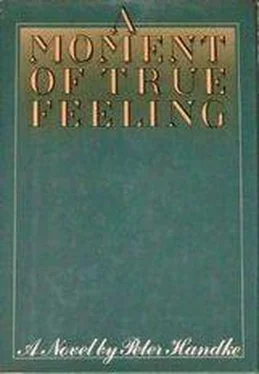The child was still singing in her room. Keuschnig managed to go in without her noticing. What am I doing here? he thought absently. By going to the child’s room he was asserting something that had ceased to be true. I’ve got to think about her, so as to feel something about her again. — Agnes’s singing grew louder, she was beginning to shout. Then she stopped singing and only experimented with lip noises. So much peace spread through the dark room from the bed that Keuschnig was able to crouch down. Once or twice the child kicked. Then at last she fell asleep, but it was only after a long sigh that her deep sleep began. Keuschnig stood up, conscious of being permeated by a sadness he had never before experienced. His sadness dispelled his fear of the people outside and he looked forward to being with them again. He would sit there and pay attention and be able to look into their faces. “She fell asleep so peacefully she’s sure to sleep until morning,” he said, delighted to be saying something superfluous himself. It was like after a patched-up quarrel, when the quarrelers confine themselves almost entirely to saying the most obvious things, wishing only to show that they’re on speaking terms again. “What a wind that was today!” he said with conviction, and when the writer’s girl friend replied: “It demolished my hairdo,” universal trust seemed to have been re-established. He didn’t mind spreading his napkin over his knees, and he was touched when Stefanie asked: “Something aperitivish?” To respond with “So do I” to everything that was said — that was harmony. — Meanwhile, the writer was still taking notes. “Are you from the police?” Keuschnig asked.
The writer was very fat and a little older than Keuschnig. Though not really clumsy, he seemed to wreck everything he touched. In lighting a match, for instance, he would crush the whole matchbox … Apparently thinking he deserved compensation for putting his notebook away, he began to talk about himself: “I haven’t anything in particular to tell you,” he said. “I’ve lost my curiosity about people. I used to be so curious that if someone said to me: ‘You’re a writer, aren’t you? Could you write about me?’ I’d think: ‘Why not?’ Today if someone even says: ‘My mother played the piano … ’ it turns my stomach. The more I realize how much I have in common with everyone, the less solidarity I feel with anyone. When I hear someone singing the praises of solidarity, I stick my fingers down my throat. Once on the stairs leading to the toilets a woman started telling me about herself. I wanted to ask her: How with that little face of yours can you presume to speak in the first person singular? On the street, when I look at the people coming in the opposite direction, I think: What a lot of biographies — and all equally boring! Sometimes I feel like asking the woman at the newspaper stand about her background — but only in derision. Once at the bar of a café a woman was telephoning in rather a loud voice. I held my hands over my ears because I wanted no part in her story. Or think of the fun we used to have listening to conversations at the tables around us. Oh, how sick I am of eavesdropping now! I see a column of cars and I think: Never again will these people interest me. Yesterday I was in Neuilly, at the house of an industrialist. His wife said: ‘I love to observe people, their hands for instance.’ And then after a while she said: ‘My little Portuguese pearl chooses to be in a bad humor today. I feel I’m entitled to harmony in my surroundings; after all, I don’t let people see how I’m feeling.’—I could hardly bear it. Good Lord, I thought, now she’s going to let her hair down. This morning I saw a death notice; it was somebody I didn’t even know, but instantly I thought: Ha, dead at last, the swine. Once when I was visiting someone, he said: ‘It’s so dusty here.’ It flashed through my mind that my place was a lot dustier, but I didn’t mention it, because I didn’t want to comfort him.” (He interrupted himself and said on a note of surprise: “I enjoyed that tomato.”) “I never want to observe anyone again,” he went on. “Not long ago, when I was looking at the people on the street, I said to myself: Maybe I should see them at work or at home in their apartments. But then I realized that there they would be even more predictable than on the street … Someone came to see me. He wanted to tell me his troubles, but I said I’d rather watch the football game on TV. I met a beautiful woman — another one of those, I thought. When I nevertheless catch myself observing somebody out of old habit, I suddenly think: But what about myself? I have a horror of looking to right or left; there’s always something waiting to be looked at: somebody else with a sweater tied around his neck, charcoal smoke pouring out of somebody else’s front garden. Once I had an appointment with somebody and decided to give him my full attention — but then when I had him in front of me, I thought: What for? And I stood there looking disgustedly at his tiresome face … I keep wondering how people can see images in the stars. I am incapable of grouping stars into constellations. The same with phenomena. I have no idea how to CONSTELLATE them, how to group them and find meaning in them. Have you ever noticed how often certain philosophers use the word ‘reconcile,’ ‘secure,’ ‘rescue’? CONCEPTS are RECONCILED, PHENOMENA are RESCUED. And what are they rescued by? By CONCEPTS. And ultimately the phenomena that have been rescued by concepts are secured in IDEAS. I admit that I have some acquaintance with ideas, but I don’t feel secure in them. I don’t despise ideas, but I do despise the people who feel secure in them — mostly because they are safe from me. Do you feel the same way, Gregor? Do you ever wake up and find you’ve lost the connection?” “No,” said Keuschnig instantly. “Every single day I’m happy to be alive, and more curious than ever. I’d have been glad to say ‘Yes, I feel the same way,’ because I know you depend on it. But I cannot afford to look on what I am doing as absurd.” “It’s a funny thing,” said the writer, pouring his glass so full that the red wine ran down over the tablecloth. “My feelings are really hurt when someone doesn’t feel exactly the same as I do. I feel kinship only with people who see no real meaning in what they are doing. I’ve met a good many people like that recently and supported them in their attitude. I had hopes for you when I included you in my survey. Isn’t there any way I can get at you?” “I almost fell for your game,” said Keuschnig, “but then I noticed that while you were complaining so exhaustively you were watching me closely, I might even say slyly. I know all about that from the child: she can be crying for all she’s worth and at the same time observe every detail of my face without batting an eyelash. Besides, how can you expect me to believe you’re not curious when you take notes as you were doing just now?” “I didn’t put down anything about you,” said the writer. “It just happened to cross my mind that my only experience today was the con-sommé madrilène I had for lunch. For the moment you can feel safe from me.” “Maybe I’ll change places with you sometime,” said Keuschnig. “It must give you a sense of triumph to be able to complain the way you do in the presence of others.” “Mostly it makes the others feel better,” said the writer. — At that moment Stefanie asked him: “What sign are you?” and everyone burst out laughing except Françoise, the woman who had come with the writer. — The writer laughed so hard the snot popped out of his nose.
While they were still laughing, Françoise said seriously: “I would like to tell the story of my life, and do you know why? Because I keep discovering more and more how much I have in common with other people of my age, especially women. To tell the truth, all my experience has been very impersonal, yet there has always been something very personal about it. When I think back, my personal experiences always seem to have been brought about by the political events of the time. The day the North Vietnamese took Dien Bien Phu, my stepfather got drunk and raped me. The man who later became my husband took advantage of a headline about an OAS bombing to speak to me on the bus. After the Algerian War we had to move because our apartment was owned by a dispossessed Algerian colonist, who needed it for himself. When France walked out of NATO, I lost my job as secretary on an American Air Force base. In May 1968 my husband went off with another woman … Perhaps it’s because I’m a woman that so much of my experience has been determined by outside events. Almost all my experiences have been sad; as a matter of fact, you can hardly call them experiences. But they’ve changed me. If at the age of forty I get cancer or they take me to an insane asylum, I’ll know why.” “What about your more cheerful experiences?” the writer asked. “Do you account for them in the same way? Your possibly beginning to love me, for instance?” “Thanks to the unions,” said Françoise, “I have a steady part-time job. As a result, the work doesn’t disgust me as much as it might, and I’m not so worried about being thrown out of work. That gives me more time for the better feelings.” The writer wrote something in his notebook. “I just remembered,” he said, “that every time the waiter at the restaurant today opened a bottle of wine he held the cork up to his nose but didn’t really smell it.” “Yes,” said Françoise, “but did you notice how worn down his heels were? I think the reason you’ve lost interest in people is that you’re always looking for obscure details and you’ve run out of them. There’s nothing left for you to discover but the inexhaustible riches of everyday life, and you turn up your nose at that.” “I have not run out of obscure details,” said the writer, who ate with his left hand and wrote so vigorously with his right that the table moved. “In the last few minutes,” he said, “my curiosity has revived — right now I’m curious about somebody.” Françoise pinched his fat cheek and he suddenly stuck his finger in her ear. “About whom?” asked Keuschnig, who, feeling secure, had almost humbly let them talk the whole time, while looking at the wart in Françoise’s shaved armpit. “About you, my dear Gregor,” said the writer, without looking up from his notebook. His ball-point broke; without a moment’s delay he took out another and went on writing. This time no one laughed but Stefanie.
Читать дальше












